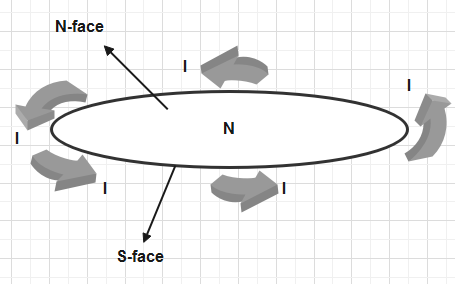Question
Question: A moving charge can produce a magnetic field .How does a current loop behave like a magnetic dipole?...
A moving charge can produce a magnetic field .How does a current loop behave like a magnetic dipole?
Solution
All magnetic phenomena results from the forces between the electric charges in motion. A moving charge or a current set up will create a magnetic field in a space surrounding it. Just like an electric field, a magnetic field is also a vector quantity, a vector associated with each point in space. Current loop also behaves as a dipole.
Complete step-by-step solution: -
As we know, a moving charge will create electric current in the conductor. According to an Italian Jurist, electric current flowing in the wire affects a magnetic needle, this fact was studied by Danish Physicist Oersted. He observed that electric current in the wire will affect the magnetic needle just like it is affected by a magnet placed near a needle. As magnet placed near the needle will deflects the needle similarly a current carrying conductor when placed near a needle then it deflects then it is clear that a current carrying conductor will create magnetic field around it as it is created by a magnet.
Hence it is concluded that moving charge can produce magnetic fields.
In the circular loop as shown in the figure current is moving in the loop as we see from the top it is shown that it is in anticlockwise direction and at the bottom of loop it is clockwise direction.
According to Clock face rule, when current flows in Clockwise direction it shows south polarity and when current flows in anticlockwise direction it shows north polarity.

So here in this current loop top face current is counterclockwise so it behaves like a north pole and bottom face current is clockwise so it behaves like a south pole as shown in figure.

We know that magnetic dipoles consist of two poles so this loop also consists of two poles. So we can conclude that a current carrying loop can behave like a magnetic dipole.
Note: A magnet attracts small pieces of iron, cobalt, nickel etc. The space around a magnet within which its influence can be experienced is called its magnetic field and due to this magnetic field, magnetic forces are experienced and magnetic forces exert a force on a moving charge and on current carrying conductor.
